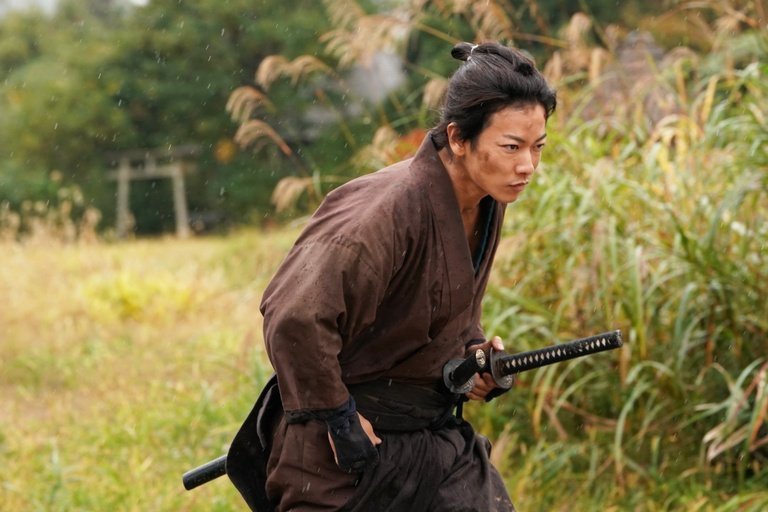The arrival of representatives of a culture from the west creates disquietude in the Lord Itakura (Hiroki Hasegawa) of the east. The Lord is at the brink of a conflict with his contemporary and the advent of Commander Perry (Danny Huston), who disguises himself as the harbinger of social and structural advancement, discomposes our lord for he is either aware of his limitations or anxious to know his abilities. The Lord puts his samurai warriors in a litmus test as chaos engulfs his mind. He announces a 36-mile marathon for the soldiers to test their valour and capabilities. This is the fundamental account upon which Bernard Rose’s epic samurai jidaigeki ‘Samurai Marathon (サムライマラソン)‘ rests.
Bernard Rose, known for his epic biographical musical ‘Immortal Beloved’ and acclaimed horror ‘Candyman’, loosely adapts Akihiro Dobashi’s “The Marathon Samurai: Five Tales of Japan’s First Marathon” in his latest offering which comes out like a fine cocktail of different tastes served on an aesthetically pleasing platter.
Samurai Marathon interweaves five tales into one journey reflecting the aspects and outcomes of misinterpretations, treachery, explorations, courage, and cowardice. Jinnai Karasawa (Takeru Satoh) masquerades himself as an accountant but is bounded by his inherited loyalty to Shogun Tokugawa, working as a spy-ninja within the Annaka clan.

Lord’s announcement for the race is mistaken to be a rebellion by Jinnai who raises a false alarm in the capital as a response to which a team of assassins is dispatched. As realization strikes, repentance and rectifications start to demand heavy costs. The second story is of a foot-soldier Hironoshin Uesegi (Shota Sometani) working to rise up the ranks of a samurai and is a brilliant runner. The third tale is of Isuke, a bright kid who aspires to be a samurai like his father was.
The fourth is of rebellious Princess Yuki (Nana Komatsu) who exploits the chaos in the castle for a quick escape as she doesn’t want to be tied into a nuptial string with Heikuro Tsujimara (Mirai Moriyama), the Lord’s most trusted samurai, as decided by the Lord himself. The fifth account narrates the castle’s former guard Mataemon Kurita’s (Naoto Takenaka) struggles to carve his own place.
The intermixing of the plight of these five characters with Jinnai’s arc kept central to the narrative renders a thrilling yet comical experience garnished with a few sword-slashing episodes that have been a signature of samurai epics. The plot introduction is rushed in the first quarter without much screentime for substantial character development and the pace normalizes by the time the film reaches its second half, quickening again as the film ascends to its pre-climax. However, none of the arcs come out as unnecessary since each serves a different aspect of the journey. That being said, I opine that editing must always remain uncompromised to keep the screenplay smooth and gripping.
But Samurai Marathon is essentially dominated by its positives which are nothing less than marvellous. Cinematographed by Takuro Ishizaka and designed by Takashi Sasaki, the film is vividly beautiful as it successfully recreates the Japan of Edo era. Where each frame becomes a painting, the audience is not only exposed to alluring and raw frames of scenic beauty but the team also ensures that contrasting shades encapsulate our screen for a long-lasting effect, whether it is through the spilling of blood red on mustard yellow or through the women clad in aquamarine-kimonos in a castle of otherwise dull exteriors.
Philip Glass is helming the music department for this film and he does a remarkable job. The score is brilliantly suited to the screenplay to create thrills when required and to build tension during the battle scenes. Academy Award-winning costume designer Emi Wada deserves applause for her designs in Samurai Marathon. They feel authentic to the era the film is set in.
On its grey side, the climax falls flat posterior to a well-built narrative that hinted at an immense underlain potential. A few plot points are indigestible since an episode that weaves itself upon internal deceits and revelations to grow into a life-threatening situation converts itself into a mockery reeking of shortsightedness quite hurriedly due to which you start to wonder if it was a planned effort at establishing supremacy through the subjugation of the rivals or was simply a suicide mission in the hindsight by its perpetrators blinded by rage and/or overconfidence. I also believe that the action sequences deserved greater screentime. They, however, carry a realistic appeal which lends authenticity and vulnerability to the sequences.
When the British brought arms to the Indian empires, the Rajput rulers viewed them as a sign of cowardice. The great Japanese empire went through a similar turmoil with its introduction to guns by the Americans. These were the warrior clans, rooted in their culture and of those who sought pride in facing their enemies. Bernard Rose attempts to sketch a historical account underlining the great valour of the warriors derived from their culture while also maintaining the human attributes they carried which makes this film a must watch.


